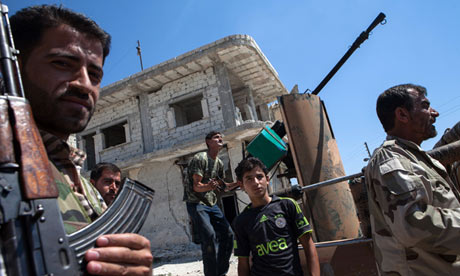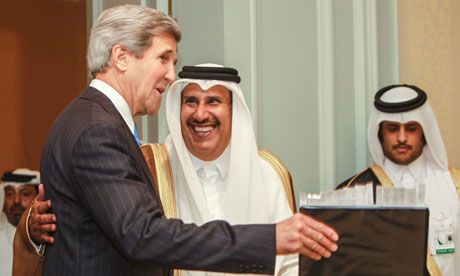There is a group of imperialists and their bootlickers who call themselves the "friends of syria", and they have decided to provide military aid to the "rebels" fighting against the government of Bashar Al Assad. Now, these "friends" include the united states, france, germany and the u.k., and they have condemned "outside interference" in the internal affairs of Syria. Please tell me I don't need to point out the utter and brutally fucked up hypocrisy of countries with track records like those "friends" mentioned above. Are the u.s. friends with anyone, or is it ALWAYS a relationship of ownership and domination, or if not that, then inter-imperialist competition? Same with the u.k, germany, france, etc., and of course, our own "kinder, gentler imperialism", with fuckwad harper at the helm. ALL of these assholes are known throughout history as doing nothing but interfering in the internal affairs of other countries. Fuck them.

 US Secretary of State John Kerry and Qatar's prime minister, Sheikh Hamad bin Jassim al-Thani, after a ministerial meeting on Syria, in Doha, Qatar. Photograph: Str/EPA
US Secretary of State John Kerry and Qatar's prime minister, Sheikh Hamad bin Jassim al-Thani, after a ministerial meeting on Syria, in Doha, Qatar. Photograph: Str/EPA
Friends of Syria will arm rebels for fight against Assad and Hezbollah
Statement pledges 'all the necessary materiel and equipment' after recapture of Qusair and as assault on Aleppo nears

A Rebel tries to locate a fighter plane in the village of Al-Rami in the northwestern Syrian province of Idlib. Photograph: Daniel Leal-Olivas/AFP/Getty Images
International opponents of Bashar al-Assad, the president of Syria, agreed on Saturday to give urgent military support to Western-backed rebels, aiming to stem a counter-offensive by Assad's forces and offset the growing power of jihadist fighters.
Assad's recapture of the strategic border town of Qusair, an effort spearheaded by Lebanese Hezbollah guerrillas, and an expected assault on the divided northern city of Aleppo have alarmed supporters of the Syrian opposition. The US administration has responded by saying, for the first time, it will arm rebels, while Gulf sources say Saudi Arabia has accelerated the delivery of advanced weapons to the rebels over the last week.
Ministers from the 11 core members of the Friends of Syria group agreed "to provide urgently all the necessary materiel and equipment to the opposition on the ground," according to a statement released at the end of their meeting in Qatar. The statement did not commit all the countries to send weapons, but said each country could provide assistance "in its own way, in order to enable [the rebels] to counter brutal attacks by the regime and its allies".
The aid should be channelled through the Western-backed Supreme Military Council, a move that Washington and its European allies hope will prevent weapons falling into the hands of Islamist radicals including the al-Qaida-linked Nusra front.
Ministers from the Friends group – which includes Western and Arab states as well as Turkey – also condemned "the intervention of Hezbollah militias and fighters from Iran and Iraq", demanding they withdraw immediately. As well as fighting in Qusair, Hezbollah is deployed alongside Iraqi gunmen around the Shia shrine of Sayyida Zainab, south of Damascus. Iranian military commanders are believed to be advising Assad's officers on counter-insurgency.
Two Gulf sources told Reuters that Saudi Arabia, which started supplying anti-aircraft missiles to the rebels on a small scale two months ago, had accelerated delivery of sophisticated weaponry. "In the past week there have been more arrivals of these advanced weapons. They are getting them more frequently," one source said, without giving details. Another Gulf source described them as "potentially balance-tipping" supplies.
French military advisers are training the rebels in Turkey and Jordan, sources familiar with the training programmes said. US forces have been carrying out similar training, rebels say.
Rebel fighters say they need anti-aircraft and anti-tank weapons to stem the fightback by Assad's forces in a civil war that has killed 93,000 people, driven 1.6 million refugees abroad and cost tens of billions of dollars in destruction of property, businesses and infrastructure.
Louay Meqdad, spokesman for the Supreme Military Council, which is led by former Syrian army general Salim Idriss, said it had received several batches of weapons. "They are the first consignments from one of the countries that support the Syrian people and there are clear promises from Arab and foreign countries that there will be more during the coming days," he told Reuters Television in Istanbul.
Louay Meqdad, spokesman for the Supreme Military Council, which is led by former Syrian army general Salim Idriss, said it had received several batches of weapons. "They are the first consignments from one of the countries that support the Syrian people and there are clear promises from Arab and foreign countries that there will be more during the coming days," he told Reuters Television in Istanbul.
 US Secretary of State John Kerry and Qatar's prime minister, Sheikh Hamad bin Jassim al-Thani, after a ministerial meeting on Syria, in Doha, Qatar. Photograph: Str/EPA
US Secretary of State John Kerry and Qatar's prime minister, Sheikh Hamad bin Jassim al-Thani, after a ministerial meeting on Syria, in Doha, Qatar. Photograph: Str/EPA
A French diplomatic source said Paris would increase non-lethal aid such as communications equipment, gas masks, night-vision goggles and bullet-proof vests. It would also provide assistance with military strategy and battlefield intelligence.
"All this has already started," a Western source said. "Broadly speaking, Western nations will do this, while Gulf Arab nations will deliver the weapons. It's a division of roles. If the northern front receives enough material and non-material support quickly, it could soon be equivalent to thousands of men, or even tens of thousands."
Idriss himself told Al-Jazeera International television on Saturday that his men were still lacking "effective air defence" against Assad's planes and helicopters. "That's why we are asking for shoulder-launched anti-aircraft missiles … and anti-tank missiles, modern ones with long range," he said. "We need it yesterday … because the regime is trying to recapture the whole country."
The increasingly sectarian dynamic of the war pits mainly Sunni Muslim rebels against forces loyal to Assad – who is from the Alawite minority, an offshoot of Shia Islam – and has split the Middle East along Sunni-Shia lines.
US secretary of state John Kerry said Hezbollah's role transformed the conflict "into a much more volatile, potentially explosive situation that could involve the entire region".
